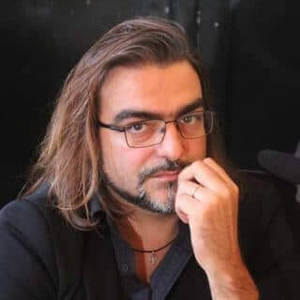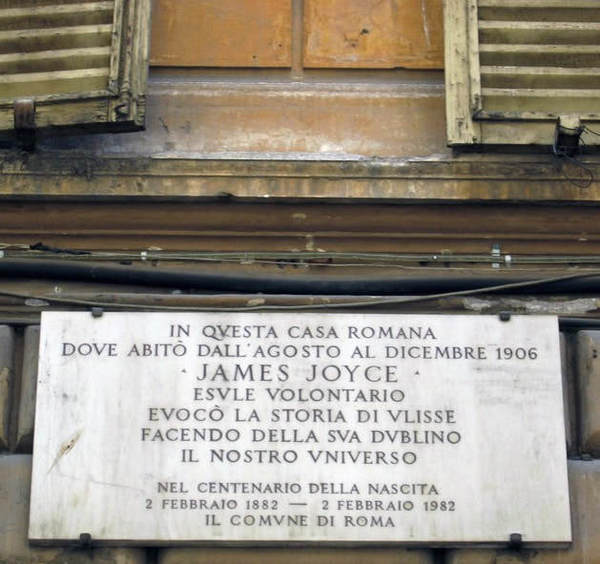
Enrico Terrinoni is Full Professor Chair of English Literature at the Università per Stranieri di Perugia. His 2012 Italian translation of Ulysses won the “City of Naples Award” for Italian language and Culture. His Italian translation of Finnegans Wake, done in collaboration with Fabio Pedone, won the Annibal Caro Prize in 2017, and his translation of The Spoon River Anthology won the City of Florence Von Rezzori Prize for translation in 2019.
Professor Terrinoni was a Visiting Fellow in Irish Studies at the Keough-Naughton Institute in Fall 2019 and a founder of the Institute's Global Ulysses initiative. During his semester at the Institute, Professor Terrinoni taught a graduate seminar on Ulysses with Declan Kiberd, now the Donald and Marilyn Keough Professor of Irish Studies and Professor of English and Irish Language and Literature Emeritus. He also led a memorable roundtable on issues of translatability and reading as a modality of “infinite translation” at the Hesburgh Libraries—an event jointly sponsored by the Institute, the Center for Italian Studies, and Rare Books and Special Collections.
Last April, Professor Terrinoni described his work on translating Joyce’s Ulysses in Rome in this posting. Then, he wrote: “Rome is strangely silent now. Living without outdoor noises for the time being is making me reflect on translation as an exercise in foreignness and confinement. The adjectives I can think of to describe this situation are: strange, extraneous, estranging.”
This year, he answers our Three Questions from a city that is, unfortunately, strangely silent once again. Rome's period of severe lockdown will extend at least through the Easter holiday.
__________________
What are you working on?
I am working on a number of projects, some of which are related to James Joyce—the author I’ve spent almost my whole life on—and this is due to the centenary of Ulysses next year.
Of some projects I cannot speak just yet, unfortunately. Let’s say that, as often in past years, my research interests are moving in three directions: James Joyce and Irish literature; translation (theory and practice); and the interactions between literary/cultural studies and other disciplines (mainly science).

Among my Joyce projects is a book on Joyce and Rome, which will come out first in Italian on 2.2.22. The title, Su tutti i vivi e i morti, means “Upon all the living and the dead”—which is a quotation from the end of the short story “The Dead.” My book is a “story,” too, not a biography. It is a story of Joyce’s seven months and seven days in the Italian capital and of the intuitions he had there. It’s a “synaptic book,” so to speak. It jumps from biography to the works through continuous associations and connections. While it is not strictly speaking an academic book, it does attempt to shed some new light on Joyce’s time in Rome. It is also meant to make everyday readers interested in Joyce.
Joyce’s days in Rome were very interesting and almost “novel-like.” It was in Rome that Joyce first had the idea of writing Ulysses, which was originally intended as a short story for Dubliners. His bleak Christmas in Rome probably inspired, by means of inversion, the dinner party in “The Dead.” And Rome, just another dead city, was probably also in part an inspiration, I think, for that other strange “book of the dead” which is Ulysses. Rome was the city where Giordano Bruno, one of Joyce’s great mentors, had been burned alive in 1600, and Joyce attended the commemoration of his death. Not only did he attend the ceremony that day, he actually took the very same route to the place of execution that Bruno had taken 307 years before. And, by then, Joyce was living with his family just a few yards from Bruno’s last prison! And he knew it, having reviewed a biography on Bruno in which this location is clearly spelt out. Why did Joyce move to the place where Bruno spent his last night? That’s the question around which my story revolves. So, it is also the story of Joyce and Bruno.
Another Joyce-related project I’m working on is the new fully annotated Italian translation of Ulysses with parallel text and lexical variants. I believe it to be the first of its kind in the world. I hope it will encourage other translators and editors to do the same.
Another project I’m working on is a book I have in mind called “A Quantum Theory of Interpretation and the Dark Matter of the Literary; or, Reading ‘open texts’ as a Probabilistic Event.” It’s quite an ambitious project and aims to apply to the theory of literary interpretation the insights of quantum physics and some cosmological discoveries that followed from Einstein’s “general relativity.” I do not have a publisher for it yet; nor have I located a grant or an institution willing to let me carry it out. There is much skepticism about interdisciplinarity in the Academia when one tries to put together realms as distant as those of cultural and literary studies and scientific approaches. It might remain an unactualized possibility of my scholarly career.
What are you reading?
I am rereading Shakespeare. The project I’ve just mentioned on a “quantum theory of interpretation” is in fact best tested on “open works,” and the works of Joyce and Shakespeare, despite the time-space divide, can become proper groundwork for it. As a matter of fact, the theory is based on “quantum leaps” and on the “principle of indeterminacy,” and I do believe that what Joyce got from Shakespeare primarily—more than the intuition that one’s life can actually turn into one’s works in mysterious ways—is the fact that they both made the most of ambiguity. Thus, relative indeterminacy is the obvious outcome in terms of reception.
I’m not just rereading Shakespeare though. I’ve just read the excellent Grace’s Day by William Wall, and another great one by William Leonard Pickard, The Rose of Paracelsus. I’m also reading a good few books on various theories excavating the origins of language.
What, during the pandemic, are you missing?
Most of all, I’m missing human contact—meeting with family and friends for a day out or at the bar. I’m missing playing soccer with my friends. I’m missing teaching in person, too. Remote teaching is very hard on the students, but it’s also hard on the teachers for the simple reason that while you know that you’re doing your best, you are also aware that only a small percentage of what you are “giving” is actually absorbed. Here is an example. In my university, many of the students are international, and most of them returned home due to the pandemic, with a great majority of those students in Asia. When I have a class at 6 pm, for some of them it might be midnight or 1 am in the morning. They are all very good and log in all the same, but it must be very hard for them to keep attention levels high. I’m also missing—it might sound strange to say—office hours! It was a great occasion for cultural exchange and talk with colleagues and students frankly, without the barrier of a screen.
Previous installments of "Three Questions":
March 2021: Professor Jennifer Todd, University College Dublin
January 2021: Professor Ailbhe Darcy, Cardiff University
December 2020: Professor Daniel Carey, National University of Ireland Galway
November 2020: Professor Sonja Tiernan, University of Otago, New Zealand